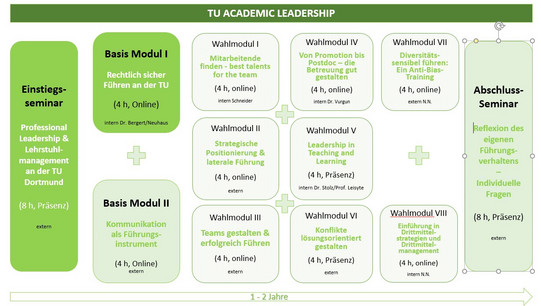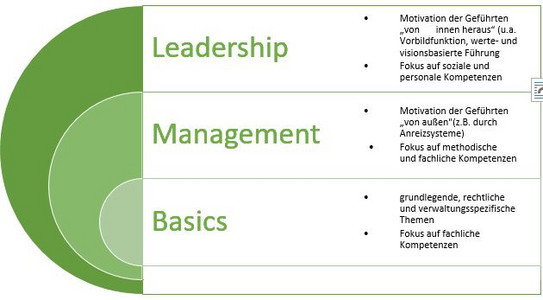TU ACADEMIC LEADERSHIP PROGRAM
Leadership development for professors at TU Dortmund University.
Objectives
This leadership program for professors at TU Dortmund University aims to build and develop leadership skills in order to effectively master the challenges of the academic world. Based on scientific leadership theories[1], the development of a personal understanding of leadership and the shaping of the respective leadership role are to be promoted.
Development of leadership skills: The program aims to support professors in strengthening their leadership skills. This includes improving communication skills, conflict resolution techniques, and the ability to effectively lead and motivate teams and create an inspiring and supportive environment for staff.
Promoting management skills and strategic thinking: Another aim is to teach strategic thinking and action. Participants should be enabled to develop long-term goals for their departments and institutes/chairs, to plan and use resources efficiently and to find innovative solutions to complex academic and administrative challenges.
Basics of leadership: Professors should be able to lead with legal certainty and learn the basic aspects of labor and employment law. In an increasingly globalized world, it is also essential to develop intercultural skills. The program should also prepare participants to communicate and cooperate effectively with a diverse group of employees, students and international partners. Participants should be empowered to promote an inclusive and respectful environment that sees diversity as a benefit.
[1] Antonakis, J., & House, R. J. (2013). The full-range leadership theory: The way forward. In Transformational and charismatic leadership: The road ahead 10th anniversary edition (Vol. 5, pp. 3-33). Emerald Group Publishing Limited.
Target group and rotations
The course is aimed at all professors at TU Dortmund University. For newly appointed professors, the introductory seminar and the basic module I are mandatory, and for those appointed for the first time, the basic module II and the final seminar have to betaken. The mandatory modules should be completed within the first two years after taking up the position.
All other professors can participate in all modules on a non-binding basis. Other academic managers (senior engineers, etc.) cannot participate in this program. A specific leadership program will be designed for this target group.
All modules will be offered several times a year. The number of runs depends on demand, which is essentially determined by two factors:
1. number of newly appointed and first-time professors of the respective year
2. demand communicated by the professorial staff
The demand is determined in March of each year. If additional topics are identified, the range of elective modules is supplemented accordingly.
The Academic Leadership Program is scientifically supervised by Professor Dr. Jens Rowold (Center for Higher Education, zhb).
In terms of a full-range leadership model[1], three subject areas are relevant for academic leadership development.
All offers and measures are assigned to these subject areas and methodically include a combination of knowledge transfer, behavior-based training and feedback on one's own leadership behavior.
[1] Avolio, B. J., & Bass, B. M. (Eds.). (2001). Developing potential across a full range of Leadership Tm: Cases on transactional and transformational leadership. Psychology Press.
Modules
Subject area Basics
- Basic module I - Legally secure leadership at TU Dortmund University
- Elective module I - Finding employees - Best talents for the team
Subject area Management
- Elective module IV - From doctorate to postdoc - organizing supervision well
- Elective module V - Leadership in Teaching and Learning
- Elective module VIII - Introduction to third-party funding strategies and third-party funding management
Subject area Leadership
- Introductory seminar - Professional Leadership and Chair Management at TU Dortmund University
- Basic module II - Communication as a management tool
- Elective module II - Strategic positioning and lateral leadership
- Elective module III - Designing and successfully leading teams
- Elective module VI - Managing conflicts in a solution-oriented way
- Elective module VII - Diversity-sensitive leadership - an anti-bias training course
- Final seminar - Reflecting on your own understanding of leadership - opportunities for further personal development - individual leadership questions





